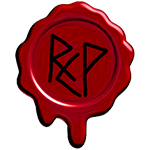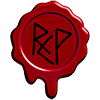You Are Enough
In Conversation with Kim Maxwell and Lily Brown
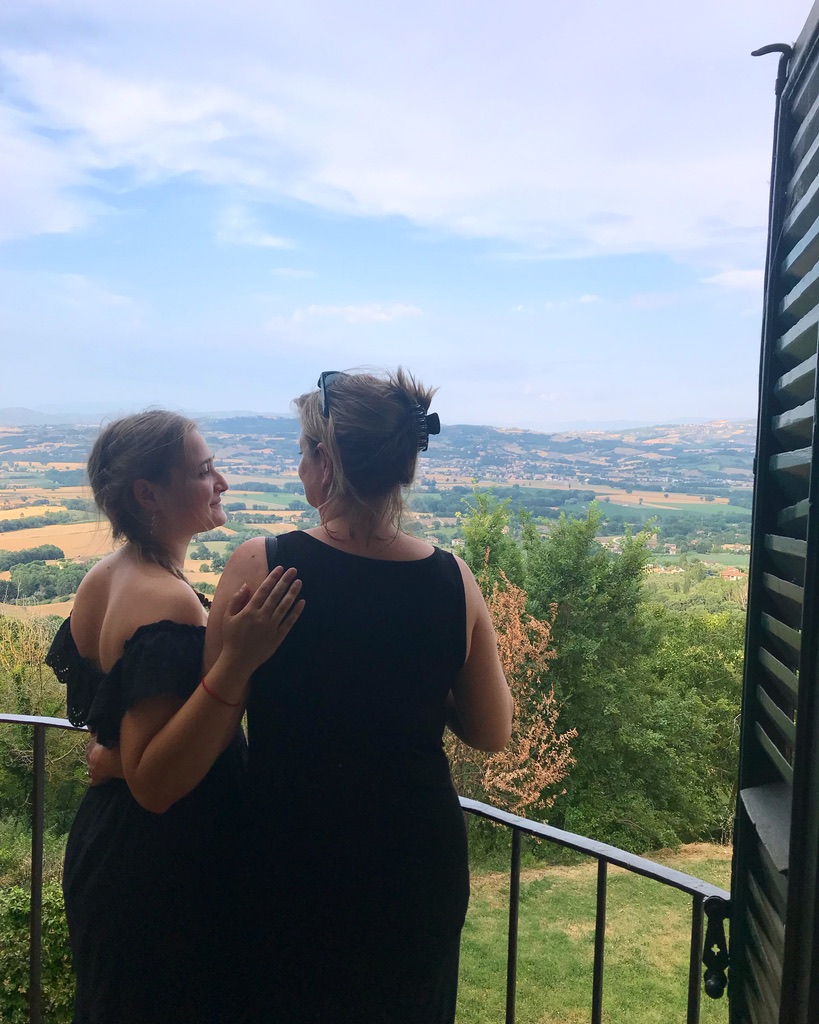
Kim Maxwell is the Founder/Executive Director of The Townies, Inc. She is a producer, director, writer, mother, teacher, wife, Founder/Principal at Kim Maxwell Studio and Creator/Producer of The Townies Podcast. She is Co-Founder of the Ojai Playwrights Conference, serving as Board Member and Director of its Youth Program for 23-years. Kim is also Co-Founder and served as co-Artistic Director of Theater 150 for 11-years.
Her transformative style of teaching has inspired absolute beginners and professional actors alike. With her compassionate guidance, students undertake the fulfilling and transformative process of discovering, developing and performing their own stories. From preteens to senior citizens, over a thousand of Kim’s students have gathered in living rooms, theaters, and even detention centers throughout Los Angeles and Ventura Counties to share their stories and have their voices heard.
Kim received a Lifetime Achievement in the Arts Award from the City of Ojai in 2013 and, most recently, was named the 2018 Visionary of the Year by the National Association of Women Business Owners (NAWBO).
Lily Brown is a proud jack of many trades. With her degree in Spanish, Drama and Political Science from Bennington College, Lily is Producing Director of The Townies, Inc, Producer of The Townies Podcast, Associate Director of the Ojai Playwrights Conference Youth Workshop, an editor, a translator, an actor, a writer, a social media coordinator and a graphic designer. While her interests are varied and her jobs plentiful, Lily’s passion for good storytelling remains foremost in all of her endeavors.
Interviewed by Billy Lezra and Liam Lezra | October 6, 14, and 22, 2020
The following interview has been edited and condensed for clarity.
Who are some of your most influential teachers, and why?
Lily Brown
Well it feels a little funny to say so because she’s sitting right there but of course I would say my brilliant momma who I’ve studied with since I was a preteen. And my dad who’s always inspired and supported me as an artist.
I had a Spanish teacher in high school named Nestor Geronimo who pulled back the curtain on languages, which helped me fall more in love with writing. I think being multilingual is like opening a door and then putting on glasses… you realize that there’s so much more out there and you see everything a little differently. I’m really grateful I’ve had the opportunity to study other languages.
I also have a new acting teacher named Joshua Bitton, based here in L.A. His whole style is about is “you are enough,” which resonates with what my mom teaches. His class has been really meaningful to me during this incredibly difficult time we’re in.
Kim Maxwell
I was diagnosed with dyslexia in my mid-twenties. I was treated like I was stupid in school in the seventies. I went from being a straight-A student to just tanking from eighth to ninth grade. Nobody was like, “Oh, this student was really good and now they have a problem; I wonder what’s going on.” My dad’s infamous response to both my brother and I was: “well, the world needs ditch diggers.” So, I just assumed I was stupid. It took me five years after high school to move to L.A. for college. I took an English class because I was forced to as part of the curriculum. The first thing our teacher did was move our desks into a circle. Her name was Miss Sunshine. I don’t know if that was actually her name, or just the way I perceived her.
She had us do a free-write and to read our material out loud. In front of the whole class, she told me, “you are a writer.” She talked to me afterwards and changed the course of my life.
There’s this hooky, spooky prayer I do before every performance. I invoke the prayer on the shoulders of the people we stand on. I thank all the teachers that influenced us and brought us to this place: the good ones that pushed us and held us and moved us forward, and the ones that were truly abominations that actually forced us to become more resilient and a larger version of ourselves.
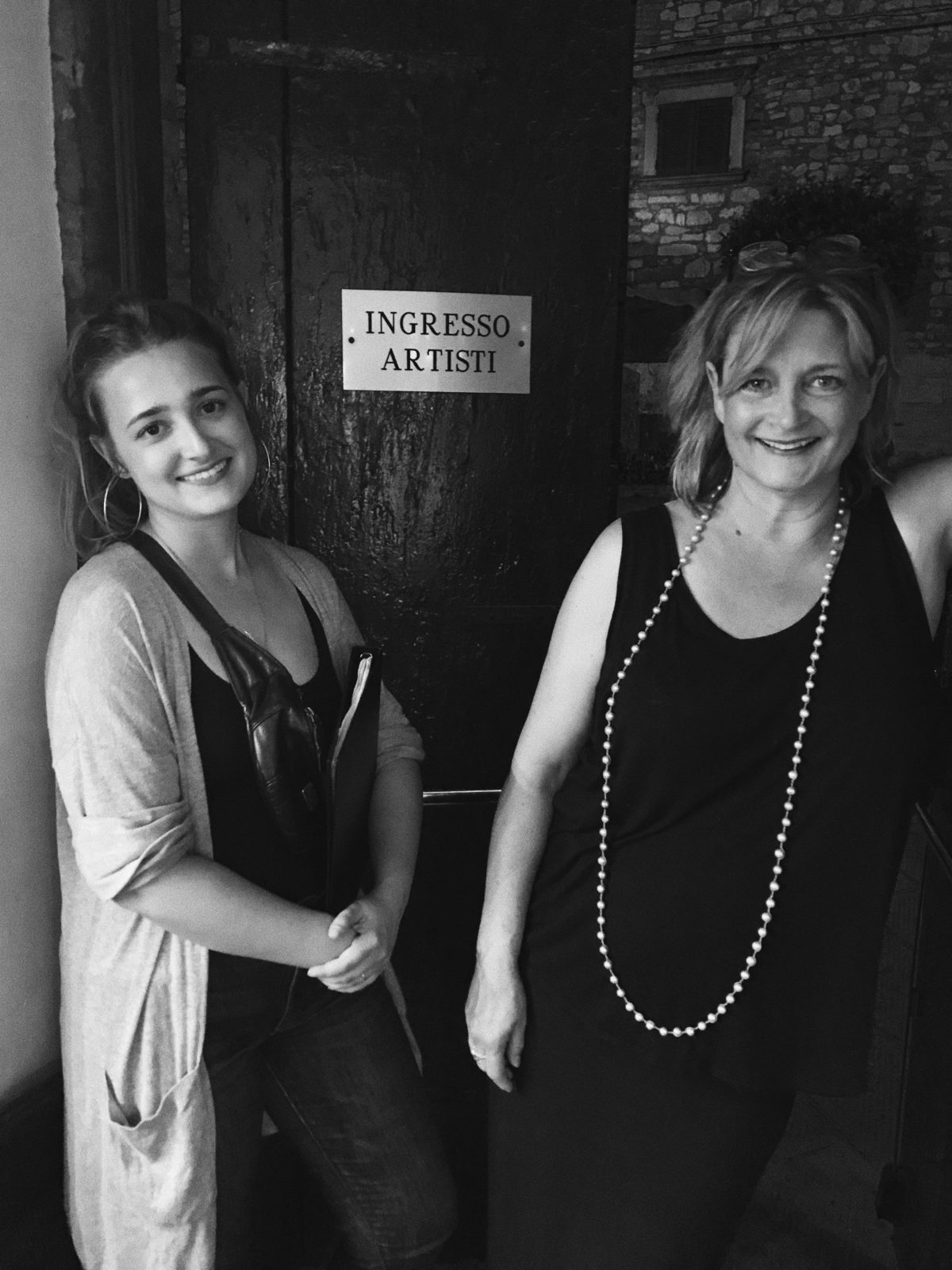
What is the best advice you have ever received?
Kim Maxwell
I think a lot of it was experiential with Bob McAndrew. The exercise that impacted me most is “the check,” which is an exercise where you stand, feet shoulder width apart, hands by your side, breath deep in, through your nose, and out, through your mouth. You check in with your ensemble mates or your audience across from you. You say “I feel,” followed by what you feel, and you’re restricted to one word. Scene work and monologue work was always prefaced by a check. It has remained an essential part of my work as an artist and teacher because I believe you have to begin with the honesty of who you are and what you are feeling in the moment
before creating a character from the inside out, writing a single authentic word or directing the work of another. For me personally, the exercise developed a sense of inner confidence in what I was feeling in the moment, and who I was.
Another experience that was really transformative for me was when Terrence McNally came to speak in our youth workshop. When he was on his way out, a student leapt out of his seat and asked: “what is the last remaining piece of advice you have for a young artist?” And McNally turned around and said: “always work with people that are better than you.”
Lily Brown
It goes back to the idea that is inherent in the storytelling workshops my mom offers, which is that the story that you have is enough. The work that exists inside of you is enough. The work isn’t out there. It isn’t some degree that you don’t have. It isn’t the house that you don’t have. It isn’t the perfectly scheduled day where you know exactly what you’re doing and you do it all. It’s already there. You don’t need to buy or do anything else in order for what you are to be enough, and good.
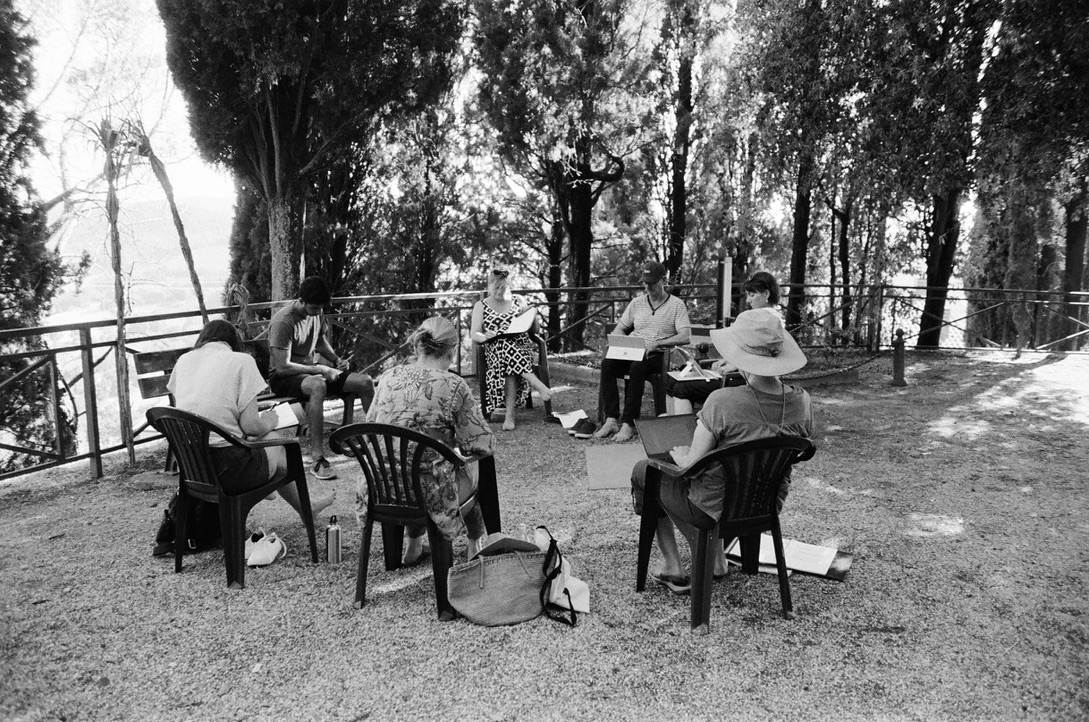


How did you two start working together?
Kim Maxwell
She totally saved my ass when she was in college. When I launched the studio there was so much to get done. Lily just came in and climbed one technological mountain after the other, then applied it to the studio. We started growing and it was really, really wonderful.
Lily Brown
Well I started taking her class when I was 10 or 12, all the way through high school. Then in college I started writing the newsletters and I helped organize the IndieGogo campaign that launched the studio space. And it’s just grown and evolved since then to include event producing, fundraising, social media, I learned how to make a website and how to produce a podcast… I’ve definitely stayed true to my liberal arts multi-disciplinary roots!
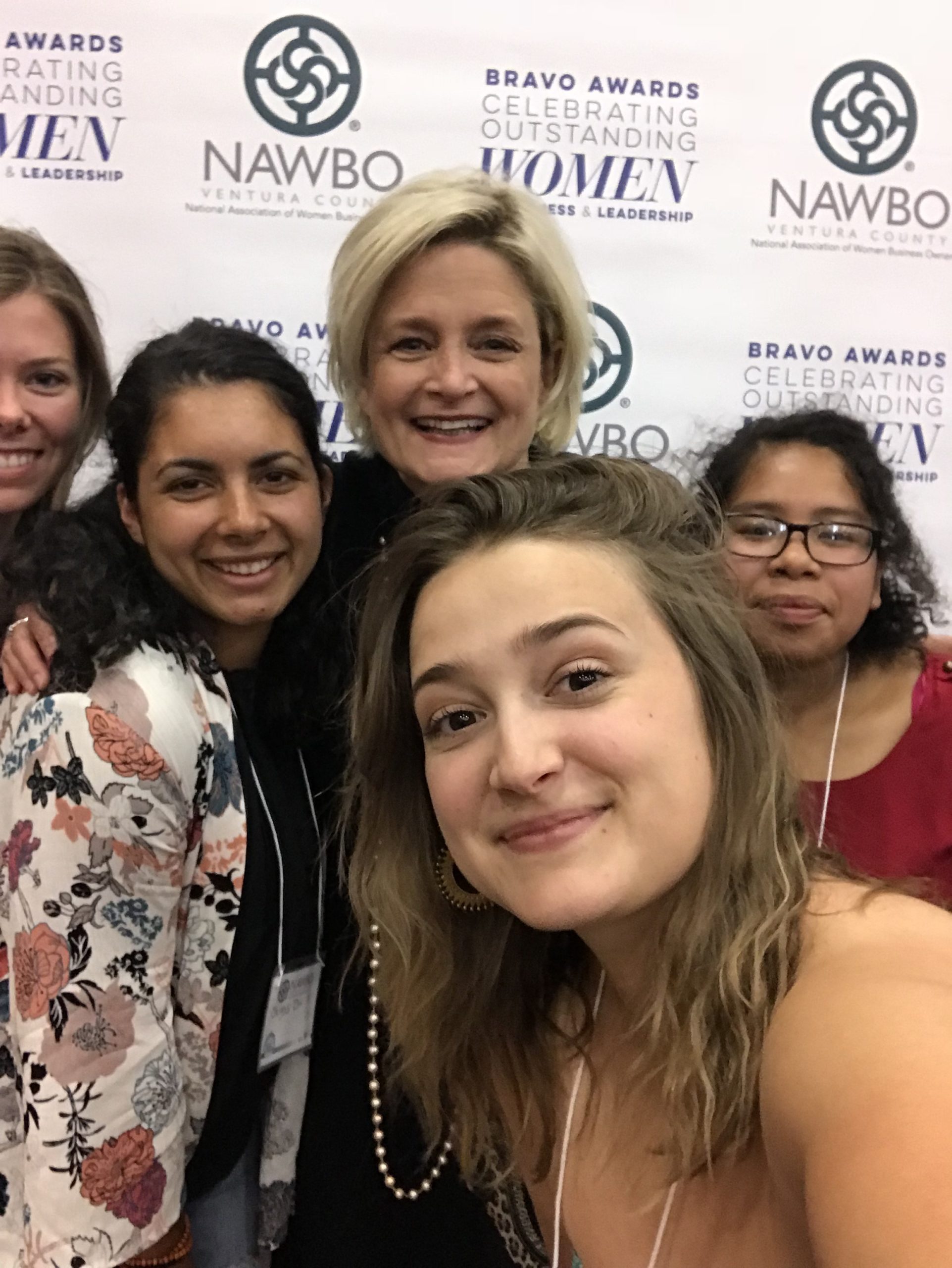


How did you choose Bennington, and what did you study?
Lily Brown
I chose Bennington after I met a really great representative who came to my high school. It’s always been hard for me to choose one specific discipline or one thing that I am interested in so when she started talking to me about liberal arts, I felt like something clicked. Her name was Chrissy Osmulski and, unfortunately, she passed away the year I graduated. I sort of dedicated my graduation to her, because I wouldn’t have been there if it weren’t for her.
The way Bennington works is that you write an essay called your “plan” that sets a sort of intention for what you are going to study, as opposed to picking a major. After some dabbling around in many disciplines, I ended up landing on a combination of Spanish, drama and political science. My plan essay was about the intersection of art and history and whether art can be used as a way to heal historic wounds.
Interestingly enough, I think that’s sort of what we aim to do with The Townies in a way, helping people to reclaim something that was maybe once painful. And then, when another person who has experienced something similar comes to see it, it can be healing for them too. Like, “you and I have both been through this thing.”
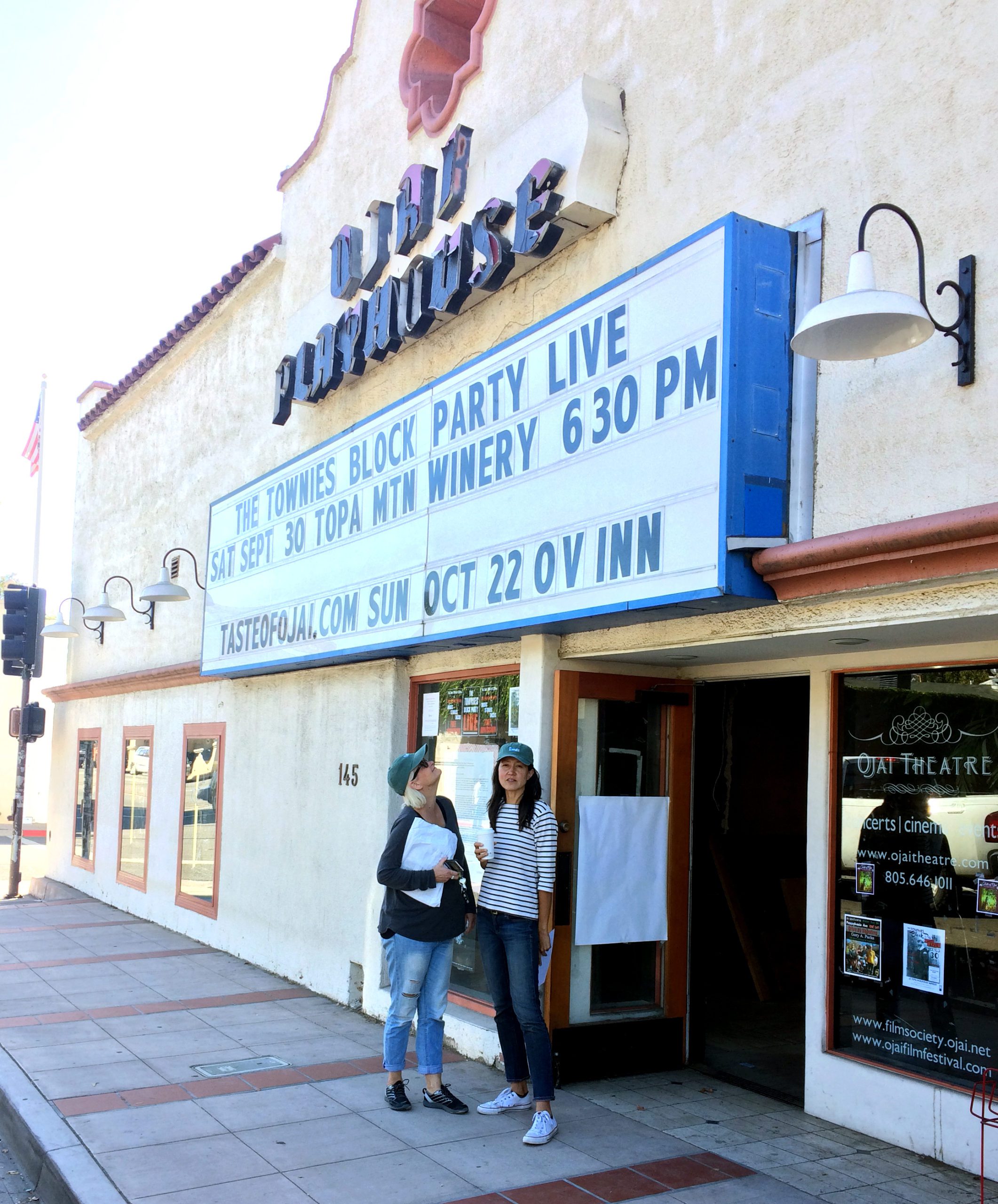


How did you decide to study in Chile?
Lily Brown
I went into the study abroad office at Bennington and picked up pamphlets for programs in Spanish. I was immediately drawn to a picture of Valparaíso, which is the most colorful, beautiful, rolling, sprawling city.
It was also the only program I found that concentrated on literature, language and history. It felt like it was calling to me, in that sense, because it lined up with my plan more than any of the other programs I read about.
I went to my adviser, who said, “It’s so weird that you would pick Valparaíso because I have a house there.” So then it just felt like kismet that I would go, and I did. And it was everything I hoped for and more.
How did living in Chile change your work?
Lily Brown
Studying in Chile changed almost everything about my work. I wrote about it in my thesis actually, in a solo show that my mom came to Bennington to direct. Before I went to Chile I feel like I gravitated towards stories that had a clear beginning, middle and end. And what I began to get perspective on, in leaving my own country and context behind and learning about another country’s history is that our stories are always ongoing, growing, repeating. It’s not like the Pinochet dictatorship ended and everything changed overnight. People will see their torturers in Santiago. People who were in power during his tenure are still walking on the streets. Just last week Chileans voted to rewrite the Pinochet-era constitution.
The most important lesson I learned, only after being taken out of my own country, is seeing that there is no real end of a problem, or end of a story because we’re only ever building on top of what came before. I brought that lens back with me and I think it made me a better writer and actually a better consumer, reader, audience-member.



How did you become interested in storytelling?
Kim Maxwell
I knew I wanted to be an actor when I was probably five or six years old, but the thought of it terrified me. I didn’t go to my first audition until I was sixteen. It was for The Crucible. I was so scared at that audition. My hands shook so hard that I couldn’t read what was on the page. I went home and sobbed hysterically for probably three days.
Then came the move to L.A, and classes, and confidence, and practice, practice, practice, and more confidence, and more practice. I went to go see a play by a writer and performer named Doug Motel. It was a piece called “Mind Salad.” It was a story about trying to overcome self-loathing. Doug played eight or nine different characters within the play. One of the characters was named Mr. Fears. I still remember him. I have a whole exercise built around it. Mr. Fears was his inner critic relentlessly bashed him with a spectacular English accent. I just remember sitting there, watching Doug and all of these characters and their stories collide, and thinking, “wait, we’re allowed to do that?”
Then I started writing my own stuff. I think the biggest leap was when I moved to Ojai from Los Angeles. I wasn’t sure that there would be a market for the kind of theater that I like, which happens in dark, small, intimate spaces. I do love going to watch a good spectacle, but what really nourishes me are the smaller more personal stories. So I started teaching a class. My friend Lana Frederick offered me her studio in her backyard. While teaching I very quickly discovered that getting people to memorize their lines was an uphill battle, unless they were pursuing acting as a living. So I started experimenting with, “well, what happens if they write their own stuff?” I found that people work really hard when it’s their own words. They memorize their lines and get shit done. I found that I loved doing that, and I started to see transformations in people through that process.
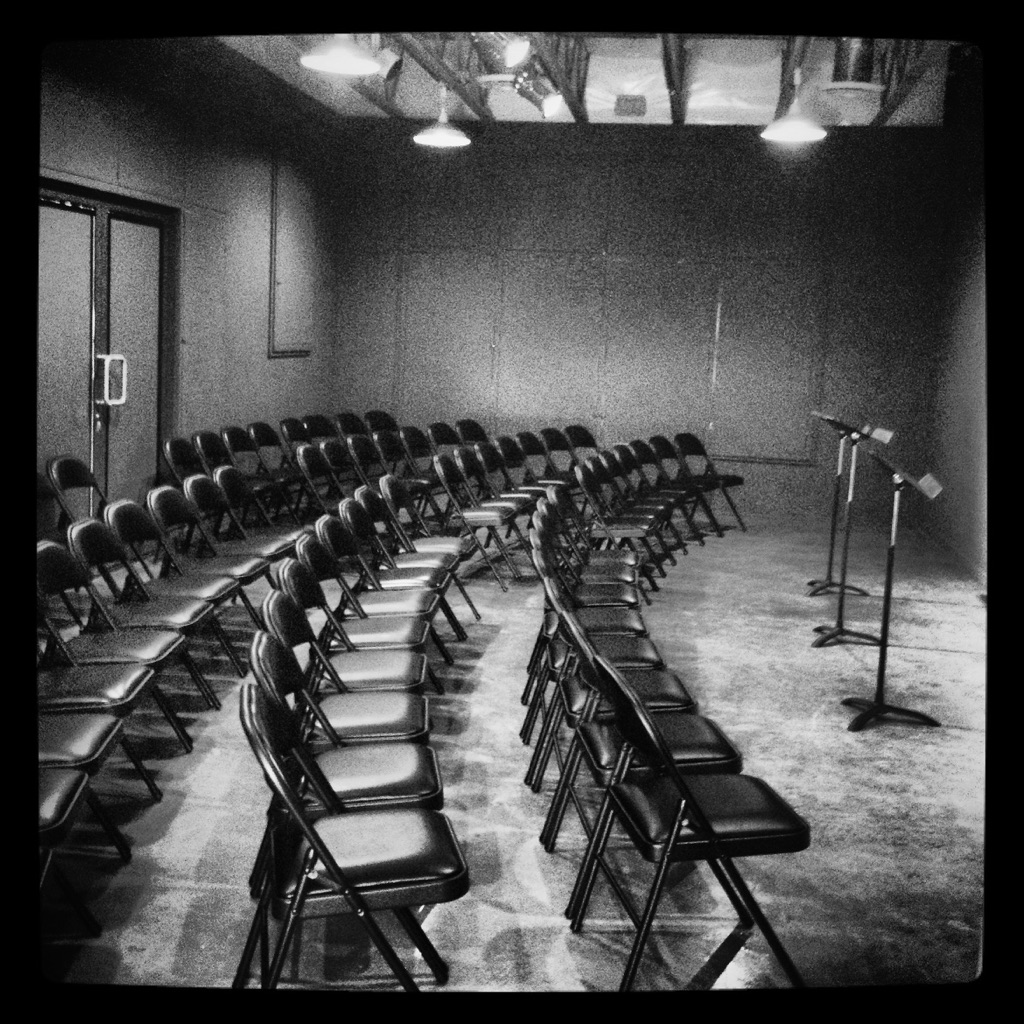


Lily, what was it like for you to grow up in a family of story-tellers?
Lily Brown
I think I was three when my parents co-founded Theater 150. So from my earliest memory, not only were my parents artists themselves, they were also creating homes for art and producing, facilitating the creation of art. I grew up seeing plays, I grew up in the context of my mom’s class, I actually paid for my first year of college with money I made from acting when I was little. Stories and theatre feel like part of my DNA in a way.
And I feel really lucky to have grown up in and around organizations that represent really unique and important pieces of the artistic puzzle. The Townies, Inc., Theatre 150, Kim Maxwell Studio, the Ojai Playwrights Conference are all really formative places for me and they all have very different missions. I think that’s helped me develop a well-rounded appreciation for writing and the performing arts.
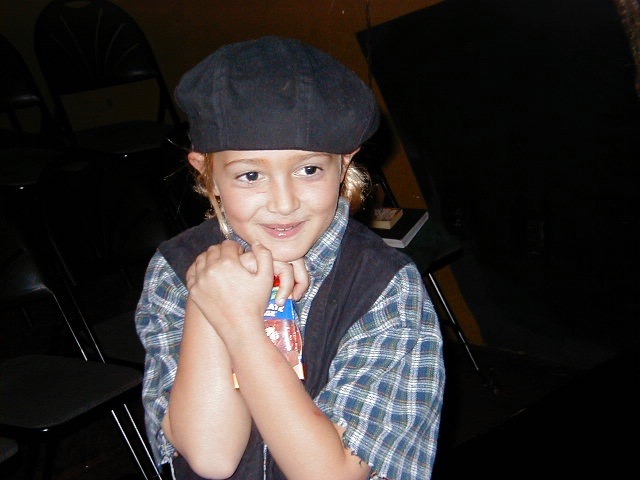


Why is it important that every story is told?
Lily Brown
The mission statement of The Townies, Inc. is to connect people one story at a time. That’s the root of it. Stories are connective tissue. Seeing somebody else’s humanity and where it aligns with your own makes it more possible to advance as a society. And one of the things I love most about our community and our workshops is that there’s a huge range of people from professional artists to folks who’ve never thought to get on a stage before, let alone with their own work. There’s such a beautiful array of experience and background and yet there’s so much in common and I love that.
I also think that a lot of people don’t believe their voice or story matters. So when people come to a show and say, “you’re the person we’re here to listen to,” there’s something really empowering in that.
Storytelling connects other people to us and connects us with ourselves.
Kim Maxwell
The most important thing to me is to develop a safe community space, where you feel like your voice is heard and valued and nurtured, and then developed to a professional level and launched into the world. It is incredibly important to develop your own story. You’re creating your own diagnostic, to move on from where you are and into who you want to be next. That is the power of the personal story: it’s the gift that keeps on giving, because as we evolve, our stories evolve. It’s this opportunity to live fully in the moment and have an exchange with someone else who is also living in the moment.
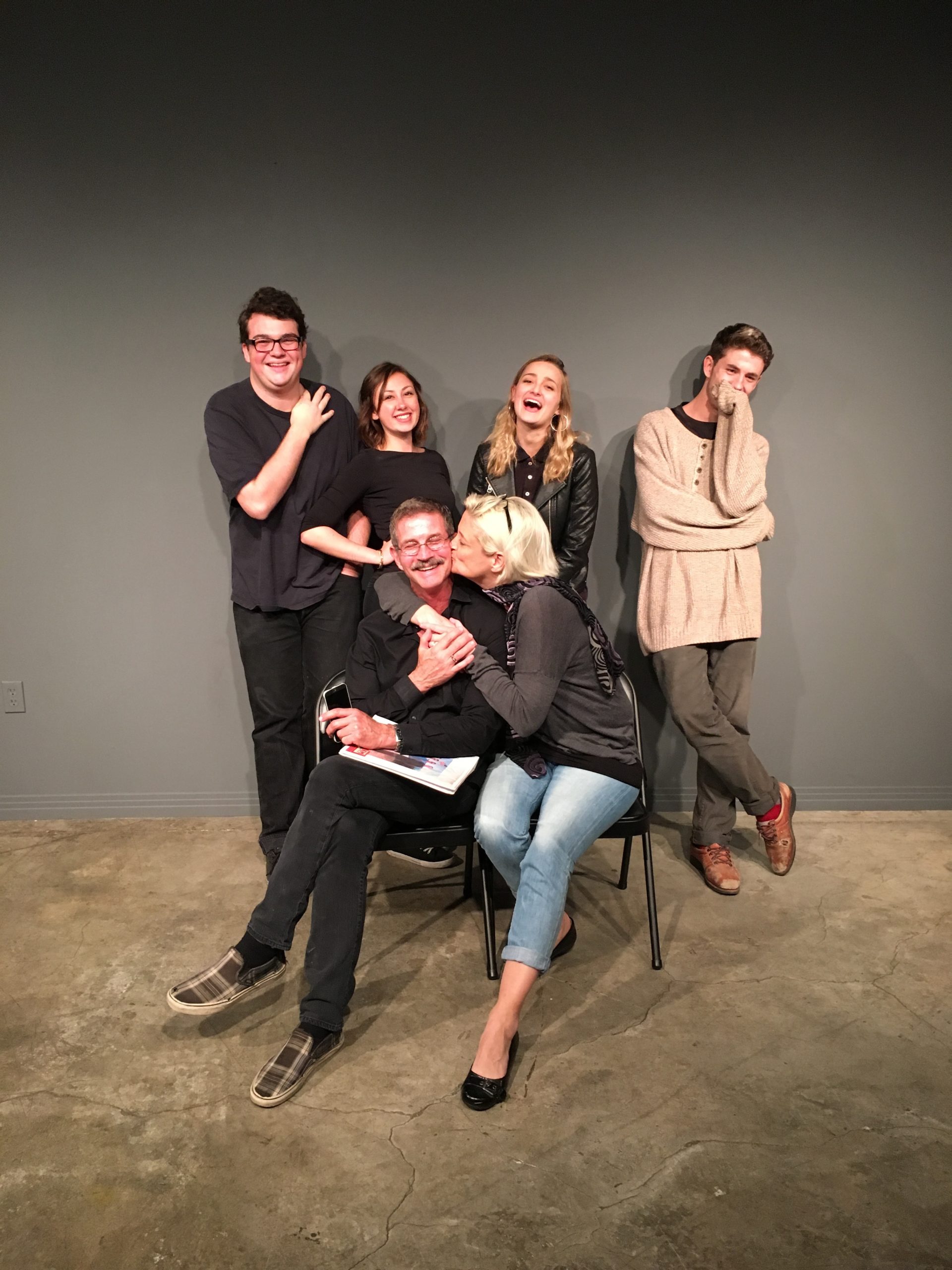


You realize that you’re not as alone as you thought you were. The places where we really connect are the places where we feel lost, broken, and not enough. There aren’t many places to cultivate that kind of vulnerability, in terms of our self-expression. But when we do, when we lead with that, the people around us generally respond with compassion and vulnerability. And that has been life-altering for me, too.
I’ve haven’t claimed the word “healing” in application to the work I do, but I would claim it now. I’ve seen it over thirty years and I’ve experienced it in my own life, too. There’s so much wisdom out there. My students are my best teachers. There’s so much I’ve learned about life from other people’s stories. Even when it’s a heartbreaking, traumatic event, it’s powerful and insightful. The trauma transforms because you’re working on it, technically. The trauma is up in your face, and the more you work on it, the more perspective you have.
What is a common experience you witness artists and creatives go through?
Lily Brown
My mom calls it the wall. You get to the point where you’ve been working on something, and you’re just like, “this is garbage, this is crap. And nobody is going to like this. And it’s shit.”
The wall is that comparison monster, that imposter syndrome of like, “I’m the only one who doesn’t know what they’re doing.” My mom is really good at helping people work through that and get to the point where they’re hopefully really happy with what they’ve done. At the very least, they feel confident enough to share it through the performance. Usually the full breakthrough comes after the after they’ve gotten the reaction and felt the validation of the audience.
You can hit a wall for years. You can be plastered to the wall!
How do you get yourself off the wall?
Lily Brown
The hard part of it, I think, is self-care and being kind to yourself, intentionally. You have to purposefully take the time to do it, or else it won’t happen. My mom has this exercise where you have your number ones, number twos, and number threes. A number one is something free or cheap that you can get or do within twenty-four hours, that will be guaranteed to bring a smile to your face. Then you have to celebrate what you’ve done, and to give yourself acknowledgement for doing it, by dancing until you laugh or something like that.
The number twos are things that might take planning or saving, or a couple of weeks to complete. And the number three is the big lifelong dream.
These exercises get you back into the cycle of caring for yourself. It fills your bucket back up so that you can bring your whole self and hopefully push past the wall to celebrate even the smallest accomplishment.
I think this is really important, especially in the arts. “Accomplishment” in the arts can be a very fickle, elusive thing. You can lose track of the goals. Or, once you hit a goal, the only one that matters is the next one. And you just keep chasing goals until you drive yourself crazy. So, taking the moment to recognize yourself for a thing that you’ve done is important.
And once you see you’ve accomplished a number one, maybe you’ll accomplish a number two shortly thereafter, and you’ll see that the number threes are just as possible.
Kim Maxwell
I think we always teach that which we most need to learn, and self-compassion is something I was born lacking. Awareness of it is a wonderful start, but then you have to develop a practice. No matter how much you cultivate a positive self-image, body-image, or artistic, creative image for yourself, at some point in time, if you’re taking a big enough risk, you’re going to run into something that overwhelms the tools that you have at hand.
I always joke that while students come to class and learn these tools of self-expression to develop the muscles to take risks — their inner critics are off at inner critic camp where they’re learning new tools from the other inner critics. And then the inner critic comes back with new material, and we are like, “god damn, I wasn’t prepared for that one. What the fuck?” And it can really sweep you off your feet because you’re not expecting it.
The reality is that the voice of the inner critic is something to be employed and used because it’s the source of all of our conflict. But we have to let it be a voice and not the driver of the bus or it can run you off a cliff, or into a wall. So, we both have to allow ourselves to go to those deeper, darker places, while having really good tools in place to pull ourselves out.
What is one of your number threes?
Lily Brown
I feel nervous to say this out loud, but I want to write and star in a TV show of my own creation. Television is one of my favorite mediums. There is something interesting about how plots in television can take a different, intricate, separate form throughout each season, and still it all fits together.
One idea was inspired by something I was doing in quarantine, beginning in March, when it was terrifying to leave the house. Every single day I watched the otter cam at the Monterey Bay Aquarium because I love sea otters more than anything in the world. And so I just watched them and knew all of their names. I have an idea for a show that takes place in an aquarium. I’ve been working on that pilot for a couple of months.
Kim Maxwell
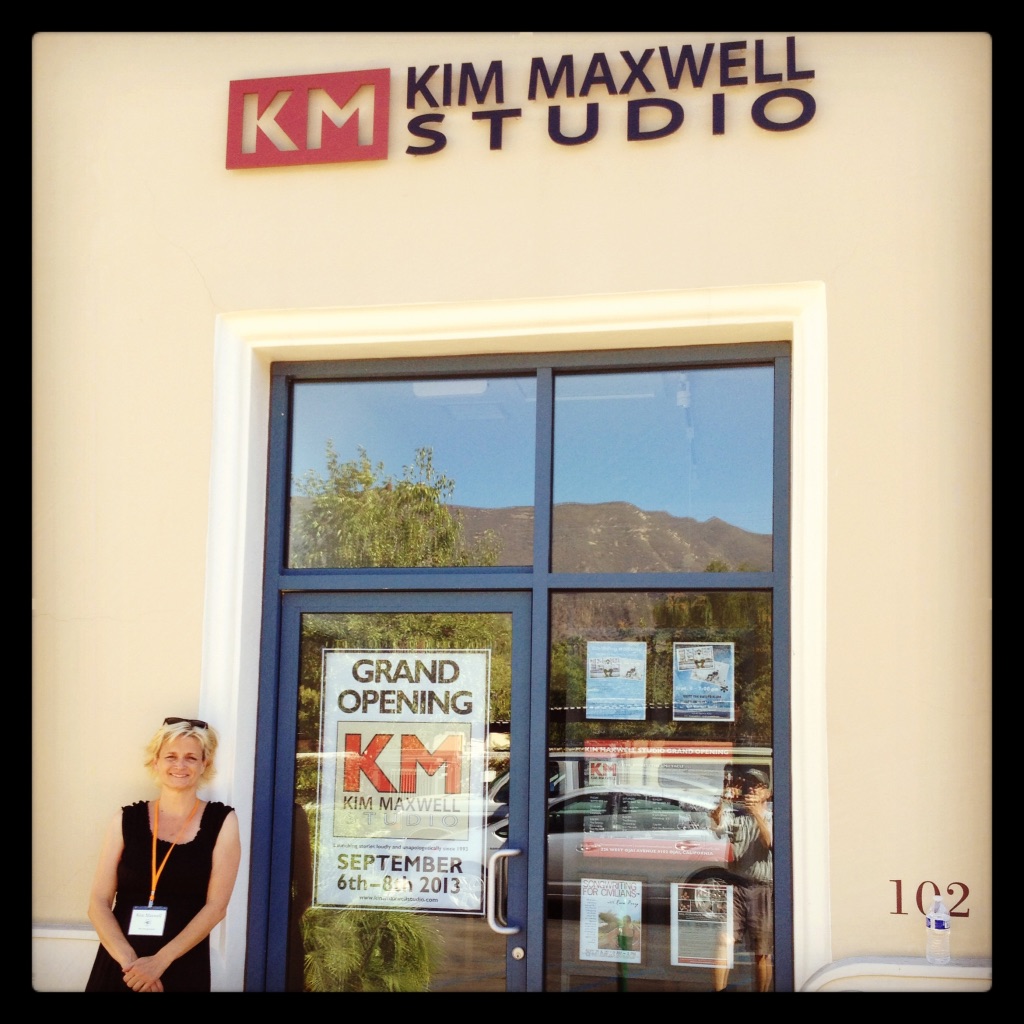


What is your creative process like as a writer and as a storyteller?
Lily Brown
I’m rediscovering it at the moment. I’ve had a multi year writer’s block where it has been hard for me to find the joy in writing. I think partly because I had a few really shitty experiences with people that made me feel like my writing was bad and didn’t matter.
It made it really hard to pick up the pen. And so I haven’t. I’m working through it at the moment and trying to find my way back to a joyful process.
It seems as if part of your work is in making other people feel like their stories matter.
Lily Brown
I see it so clearly for other people. I feel attached to and moved by the words that come out of people. I do not have that same patience or appreciation for myself. That’s one of the things that I’m trying to work on at the moment, because I wholeheartedly believe that every person’s story has value, and that it matters.
The word “matter” is such an interesting word.
Lily Brown
Yeah. And it’s such an important one, too, because it feels like it should be so easy to say that, for example, Black Lives Matter. How simple is that? That’s the simplest thing in the world to say. But some people are so averse to that idea.
What is your relationship with anger and rage?
Lily Brown
I’ve seen so many magnificent stories that start from and revolve around rage. It’s complicated because everybody should be entitled to it but, at the same time, I think holding onto it can be really bad for the soul. And there’s so much messaging around women and femmes in particular not being allowed to feel or express rage. I personally have trouble connecting to it and writing about it, and feeling okay expressing it probably because of that. But I do think writing about can be a really great thing because it takes it out of you and lets it exist and be validated in the outer world.
Actually, Audre Lorde gave a really incredible speech about anger in 1981. It’s called “The Uses of Anger: Women Responding to Racism.” There’s a quote: “hatred is the fury of those who do not share our goals, and its object is death and destruction. Anger is a grief of distortions between peers and its object is change… It is not the anger of other women that will destroy us, but our refusals to stand still, to listen to its rhythms, to learn within it, to move beyond the manner of presentation to the substance, to tap that anger as an important source of empowerment.”
I guess I feel like being angry alone doesn’t do anything, but if you turn that anger into action or use it somehow, it becomes an important tool.
Kim Maxwell
I think that personal stories are wonderful containers for rage and for anger if you allow yourself to welcome it. As a performer, you need all of your feelings. When you’re sharing with an audience, you no longer have the luxury of saying, “that’s a bad emotion and this is a good emotion.” If you’re really going to tell a story, an authentic story, you’re going to need every single emotion that you’ve experienced over the course of your life. The good news is all of those emotions are rolling around in your vehicle, in your body, and you have access to them whenever you want.
For some people, vulnerability is the most terrible, terrifying emotion to put out there. For some people, it’s anger, or joy. The reality is, in this art form of writing your own material and performing it, there’s an opportunity at hand to welcome all of who you are, even if you’re afraid of it and you don’t like it, and you’d rather look away. There’s always more space and compassion for somebody else’s injuries than for your own. That’s another reason why it’s so important to be in a community where you feel safe, because you watch somebody else struggling and you go, “oh, that’s mine. I struggle with that, too. And I feel nothing but love and compassion for this person.” And then comes the next big question, which is, “where’s that compassion for myself? Why don’t I have that for me? “ Which is a glorious and truly awful question to ask yourself. And there’s so much room from there.
You start to discover that what you think is your greatest weakness is actually your greatest strength as a communicator and as a storyteller, because great stories are always the ones you don’t want to tell. And it’s a difficult process. One of the things I always try to remind my students of is that feelings are always temporary. They never come and stay forever.
Sometimes we need professional help to help us through some of those feelings because they do get stuck. I’m a big believer in therapy, and any kind of communication that helps you become aware of your feelings and how to look at them as the asset that they are.
What brings you joy?
Kim Maxwell
Lily Brown
I think joy is one of the hardest things to nail down because it sort of happens by accident. It is hard to come across joy intentionally. I can get myself worked up and angry or sad, but for me being joyful is hard to manufacture.
Lately the thing that I miss the most and that feels most joyful is the idea of being around my friends and being with people, outside, in a park or in a bar. I don’t care what it is at this point. Just get me out of here and get me in a group of like 400 people.
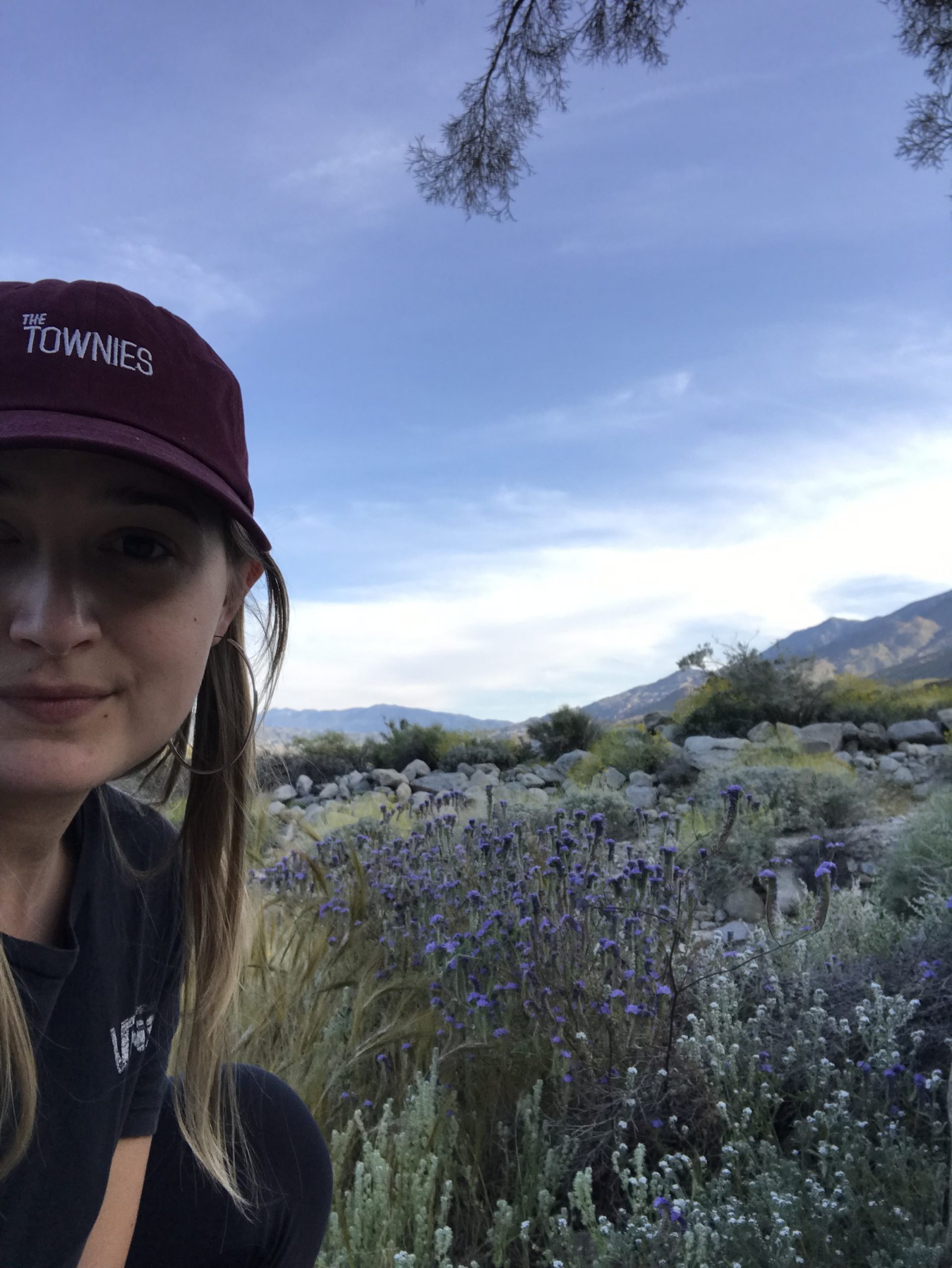


What does the word unapologetic mean to you, specifically?
Lily Brown
I think apologies are obviously necessary when you hurt somebody else. But we should encourage people to be unapologetic when it comes to taking up space, for existing, and for challenging things.
Kim Maxwell
To me unapologetic means that you have the courage and willingness to bring your whole self to the work.
And this means that all the bits and pieces that ache and hurt and feel like they aren’t enough blend in with all the tingles of joy and love, and become this vulnerable whole person that you then offer to yourself in your work, and then ultimately in my class to an audience that sits across from you, in one form or another.
Lily Brown
There’s a concept in AA and ALANON: if you aren’t feeling great, the best thing to do is to be of service to somebody else. In being of service to another person, you learn about how to do it better for yourself. And you can start asking questions like: “oh, I have a lot of compassion for another person’s journey. Why am I not doing the same thing for myself?”
How would you like to be remembered?
Lily Brown
I was so worried about this question because I saw that you ask it in all the interviews. So many people were so eloquent about it, saying something like, “I don’t know if I care about being remembered.” And I am like, “oh, I super care about being remembered. I super care. I want everyone to remember me, and I want it to be fondly and everyone to be like, wow, she was so fun and cool and brilliant.”
I wish I was totally nonchalant, but yeah, I want people to remember me as kind and thoughtful, smart, and good at what I do. I was thinking about it all night. “How can I possibly give an answer to this?” Like Brett said [in his interview with Rough Cut Press], will I know what people think after I’m gone? No, I won’t know. But I like to think that I will be remembered well.
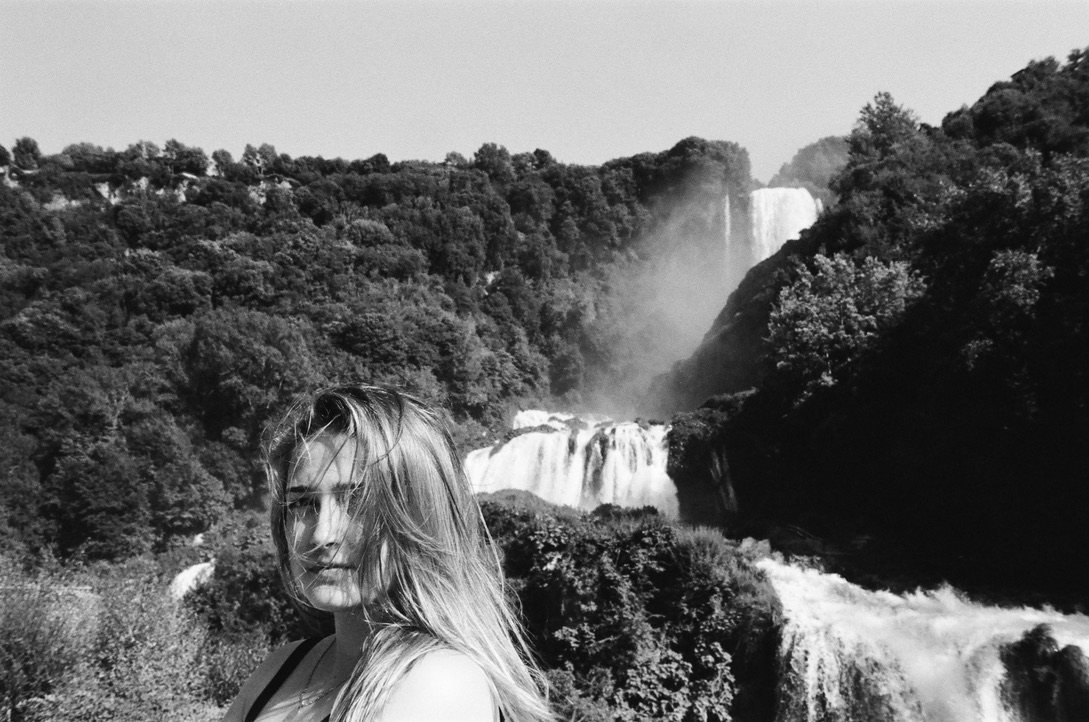


Kim Maxwell
I would want to be remembered as someone who created safe spaces for people to be the big, brave, terrified, angry, rageful, joyful, tingling version of themselves. I feel like everybody, before they die, should have their own wake, so they can hear what everyone has to say about them. It is one of the prompts I have in my class, which is: write your own obituary, and go big. Not just where you came from and what you’ve done, but all the stuff that you want to do in the future, like the Pulitzer Prize that you won, all the homes you owned all over the world, all the degrees you’ve earned. People at a wake, or memorial, or an end-of-life celebration are always so raw and vulnerable, generally speaking, in talking about how the person impacted them. I think that that would be a lovely thing to have wash over you. So, you might be invited to a wake very soon.
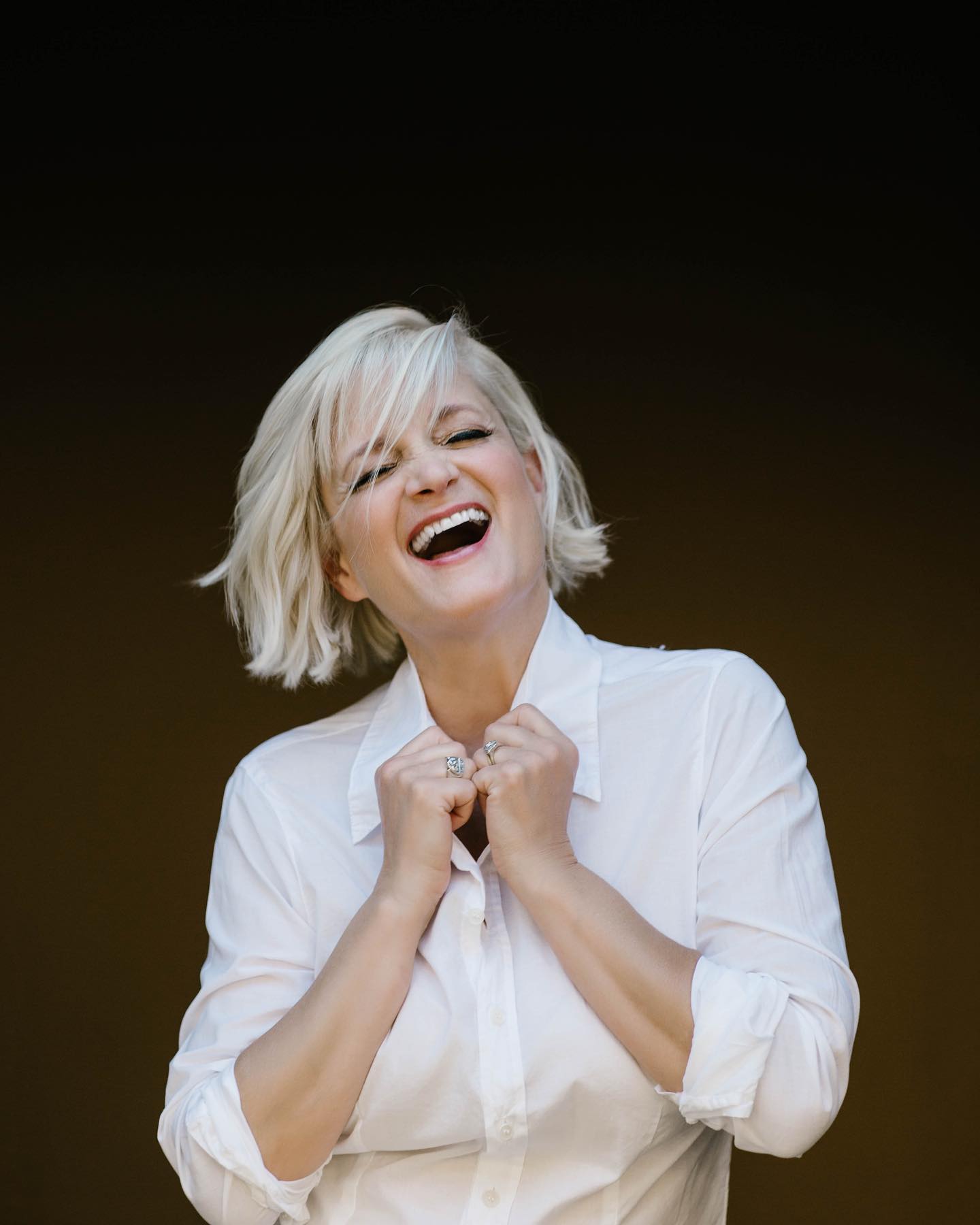


To learn more about The Townies, Inc. and Kim Maxwell Studio, visit their website.
You Are Enough
In Conversation with Kim Maxwell and Lily Brown


Kim Maxwell is the Founder/Executive Director of The Townies, Inc. She is a producer, director, writer, mother, teacher, wife, Founder/Principal at Kim Maxwell Studio and Creator/Producer of The Townies Podcast. She is Co-Founder of the Ojai Playwrights Conference, serving as Board Member and Director of its Youth Program for 23-years. Kim is also Co-Founder and served as co-Artistic Director of Theater 150 for 11-years.
Her transformative style of teaching has inspired absolute beginners and professional actors alike. With her compassionate guidance, students undertake the fulfilling and transformative process of discovering, developing and performing their own stories. From preteens to senior citizens, over a thousand of Kim’s students have gathered in living rooms, theaters, and even detention centers throughout Los Angeles and Ventura Counties to share their stories and have their voices heard.
Kim received a Lifetime Achievement in the Arts Award from the City of Ojai in 2013 and, most recently, was named the 2018 Visionary of the Year by the National Association of Women Business Owners (NAWBO).
Lily Brown is a proud jack of many trades. With her degree in Spanish, Drama and Political Science from Bennington College, Lily is Producing Director of The Townies, Inc, Producer of The Townies Podcast, Associate Director of the Ojai Playwrights Conference Youth Workshop, an editor, a translator, an actor, a writer, a social media coordinator and a graphic designer. While her interests are varied and her jobs plentiful, Lily’s passion for good storytelling remains foremost in all of her endeavors.
Interviewed by Billy Lezra and Liam Lezra | October 6, 14, and 22, 2020
The following interview has been edited and condensed for clarity.
Who are some of your most influential teachers, and why?
Lily Brown
Well it feels a little funny to say so because she’s sitting right there but of course I would say my brilliant momma who I’ve studied with since I was a preteen. And my dad who’s always inspired and supported me as an artist.
I had a Spanish teacher in high school named Nestor Geronimo who pulled back the curtain on languages, which helped me fall more in love with writing. I think being multilingual is like opening a door and then putting on glasses… you realize that there’s so much more out there and you see everything a little differently. I’m really grateful I’ve had the opportunity to study other languages.
I also have a new acting teacher named Joshua Bitton, based here in L.A. His whole style is about is “you are enough,” which resonates with what my mom teaches. His class has been really meaningful to me during this incredibly difficult time we’re in.
Kim Maxwell
I was diagnosed with dyslexia in my mid-twenties. I was treated like I was stupid in school in the seventies. I went from being a straight-A student to just tanking from eighth to ninth grade. Nobody was like, “Oh, this student was really good and now they have a problem; I wonder what’s going on.” My dad’s infamous response to both my brother and I was: “well, the world needs ditch diggers.” So, I just assumed I was stupid. It took me five years after high school to move to L.A. for college. I took an English class because I was forced to as part of the curriculum. The first thing our teacher did was move our desks into a circle. Her name was Miss Sunshine. I don’t know if that was actually her name, or just the way I perceived her.
She had us do a free-write and to read our material out loud. In front of the whole class, she told me, “you are a writer.” She talked to me afterwards and changed the course of my life.
There’s this hooky, spooky prayer I do before every performance. I invoke the prayer on the shoulders of the people we stand on. I thank all the teachers that influenced us and brought us to this place: the good ones that pushed us and held us and moved us forward, and the ones that were truly abominations that actually forced us to become more resilient and a larger version of ourselves.



What is the best advice you have ever received?
Kim Maxwell
I think a lot of it was experiential with Bob McAndrew. The exercise that impacted me most is “the check,” which is an exercise where you stand, feet shoulder width apart, hands by your side, breath deep in, through your nose, and out, through your mouth. You check in with your ensemble mates or your audience across from you. You say “I feel,” followed by what you feel, and you’re restricted to one word. Scene work and monologue work was always prefaced by a check. It has remained an essential part of my work as an artist and teacher because I believe you have to begin with the honesty of who you are and what you are feeling in the moment
before creating a character from the inside out, writing a single authentic word or directing the work of another. For me personally, the exercise developed a sense of inner confidence in what I was feeling in the moment, and who I was.
Another experience that was really transformative for me was when Terrence McNally came to speak in our youth workshop. When he was on his way out, a student leapt out of his seat and asked: “what is the last remaining piece of advice you have for a young artist?” And McNally turned around and said: “always work with people that are better than you.”
Lily Brown
It goes back to the idea that is inherent in the storytelling workshops my mom offers, which is that the story that you have is enough. The work that exists inside of you is enough. The work isn’t out there. It isn’t some degree that you don’t have. It isn’t the house that you don’t have. It isn’t the perfectly scheduled day where you know exactly what you’re doing and you do it all. It’s already there. You don’t need to buy or do anything else in order for what you are to be enough, and good.



How did you two start working together?
Kim Maxwell
She totally saved my ass when she was in college. When I launched the studio there was so much to get done. Lily just came in and climbed one technological mountain after the other, then applied it to the studio. We started growing and it was really, really wonderful.
Lily Brown
Well I started taking her class when I was 10 or 12, all the way through high school. Then in college I started writing the newsletters and I helped organize the IndieGogo campaign that launched the studio space. And it’s just grown and evolved since then to include event producing, fundraising, social media, I learned how to make a website and how to produce a podcast… I’ve definitely stayed true to my liberal arts multi-disciplinary roots!



How did you choose Bennington, and what did you study?
Lily Brown
I chose Bennington after I met a really great representative who came to my high school. It’s always been hard for me to choose one specific discipline or one thing that I am interested in so when she started talking to me about liberal arts, I felt like something clicked. Her name was Chrissy Osmulski and, unfortunately, she passed away the year I graduated. I sort of dedicated my graduation to her, because I wouldn’t have been there if it weren’t for her.
The way Bennington works is that you write an essay called your “plan” that sets a sort of intention for what you are going to study, as opposed to picking a major. After some dabbling around in many disciplines, I ended up landing on a combination of Spanish, drama and political science. My plan essay was about the intersection of art and history and whether art can be used as a way to heal historic wounds.
Interestingly enough, I think that’s sort of what we aim to do with The Townies in a way, helping people to reclaim something that was maybe once painful. And then, when another person who has experienced something similar comes to see it, it can be healing for them too. Like, “you and I have both been through this thing.”



How did you decide to study in Chile?
Lily Brown
I went into the study abroad office at Bennington and picked up pamphlets for programs in Spanish. I was immediately drawn to a picture of Valparaíso, which is the most colorful, beautiful, rolling, sprawling city.
It was also the only program I found that concentrated on literature, language and history. It felt like it was calling to me, in that sense, because it lined up with my plan more than any of the other programs I read about.
I went to my adviser, who said, “It’s so weird that you would pick Valparaíso because I have a house there.” So then it just felt like kismet that I would go, and I did. And it was everything I hoped for and more.
How did living in Chile change your work?
Lily Brown
Studying in Chile changed almost everything about my work. I wrote about it in my thesis actually, in a solo show that my mom came to Bennington to direct. Before I went to Chile I feel like I gravitated towards stories that had a clear beginning, middle and end. And what I began to get perspective on, in leaving my own country and context behind and learning about another country’s history is that our stories are always ongoing, growing, repeating. It’s not like the Pinochet dictatorship ended and everything changed overnight. People will see their torturers in Santiago. People who were in power during his tenure are still walking on the streets. Just last week Chileans voted to rewrite the Pinochet-era constitution.
The most important lesson I learned, only after being taken out of my own country, is seeing that there is no real end of a problem, or end of a story because we’re only ever building on top of what came before. I brought that lens back with me and I think it made me a better writer and actually a better consumer, reader, audience-member.



How did you become interested in storytelling?
Kim Maxwell
I knew I wanted to be an actor when I was probably five or six years old, but the thought of it terrified me. I didn’t go to my first audition until I was sixteen. It was for The Crucible. I was so scared at that audition. My hands shook so hard that I couldn’t read what was on the page. I went home and sobbed hysterically for probably three days.
Then came the move to L.A, and classes, and confidence, and practice, practice, practice, and more confidence, and more practice. I went to go see a play by a writer and performer named Doug Motel. It was a piece called “Mind Salad.” It was a story about trying to overcome self-loathing. Doug played eight or nine different characters within the play. One of the characters was named Mr. Fears. I still remember him. I have a whole exercise built around it. Mr. Fears was his inner critic relentlessly bashed him with a spectacular English accent. I just remember sitting there, watching Doug and all of these characters and their stories collide, and thinking, “wait, we’re allowed to do that?”
Then I started writing my own stuff. I think the biggest leap was when I moved to Ojai from Los Angeles. I wasn’t sure that there would be a market for the kind of theater that I like, which happens in dark, small, intimate spaces. I do love going to watch a good spectacle, but what really nourishes me are the smaller more personal stories. So I started teaching a class. My friend Lana Frederick offered me her studio in her backyard. While teaching I very quickly discovered that getting people to memorize their lines was an uphill battle, unless they were pursuing acting as a living. So I started experimenting with, “well, what happens if they write their own stuff?” I found that people work really hard when it’s their own words. They memorize their lines and get shit done. I found that I loved doing that, and I started to see transformations in people through that process.



Lily, what was it like for you to grow up in a family of story-tellers?
Lily Brown
I think I was three when my parents co-founded Theater 150. So from my earliest memory, not only were my parents artists themselves, they were also creating homes for art and producing, facilitating the creation of art. I grew up seeing plays, I grew up in the context of my mom’s class, I actually paid for my first year of college with money I made from acting when I was little. Stories and theatre feel like part of my DNA in a way.
And I feel really lucky to have grown up in and around organizations that represent really unique and important pieces of the artistic puzzle. The Townies, Inc., Theatre 150, Kim Maxwell Studio, the Ojai Playwrights Conference are all really formative places for me and they all have very different missions. I think that’s helped me develop a well-rounded appreciation for writing and the performing arts.



Why is it important that every story is told?
Lily Brown
The mission statement of The Townies, Inc. is to connect people one story at a time. That’s the root of it. Stories are connective tissue. Seeing somebody else’s humanity and where it aligns with your own makes it more possible to advance as a society. And one of the things I love most about our community and our workshops is that there’s a huge range of people from professional artists to folks who’ve never thought to get on a stage before, let alone with their own work. There’s such a beautiful array of experience and background and yet there’s so much in common and I love that.
I also think that a lot of people don’t believe their voice or story matters. So when people come to a show and say, “you’re the person we’re here to listen to,” there’s something really empowering in that.
Storytelling connects other people to us and connects us with ourselves.
Kim Maxwell
The most important thing to me is to develop a safe community space, where you feel like your voice is heard and valued and nurtured, and then developed to a professional level and launched into the world. It is incredibly important to develop your own story. You’re creating your own diagnostic, to move on from where you are and into who you want to be next. That is the power of the personal story: it’s the gift that keeps on giving, because as we evolve, our stories evolve. It’s this opportunity to live fully in the moment and have an exchange with someone else who is also living in the moment.



You realize that you’re not as alone as you thought you were. The places where we really connect are the places where we feel lost, broken, and not enough. There aren’t many places to cultivate that kind of vulnerability, in terms of our self-expression. But when we do, when we lead with that, the people around us generally respond with compassion and vulnerability. And that has been life-altering for me, too.
I’ve haven’t claimed the word “healing” in application to the work I do, but I would claim it now. I’ve seen it over thirty years and I’ve experienced it in my own life, too. There’s so much wisdom out there. My students are my best teachers. There’s so much I’ve learned about life from other people’s stories. Even when it’s a heartbreaking, traumatic event, it’s powerful and insightful. The trauma transforms because you’re working on it, technically. The trauma is up in your face, and the more you work on it, the more perspective you have.
What is a common experience you witness artists and creatives go through?
Lily Brown
My mom calls it the wall. You get to the point where you’ve been working on something, and you’re just like, “this is garbage, this is crap. And nobody is going to like this. And it’s shit.”
The wall is that comparison monster, that imposter syndrome of like, “I’m the only one who doesn’t know what they’re doing.” My mom is really good at helping people work through that and get to the point where they’re hopefully really happy with what they’ve done. At the very least, they feel confident enough to share it through the performance. Usually the full breakthrough comes after the after they’ve gotten the reaction and felt the validation of the audience.
You can hit a wall for years. You can be plastered to the wall!
How do you get yourself off the wall?
Lily Brown
The hard part of it, I think, is self-care and being kind to yourself, intentionally. You have to purposefully take the time to do it, or else it won’t happen. My mom has this exercise where you have your number ones, number twos, and number threes. A number one is something free or cheap that you can get or do within twenty-four hours, that will be guaranteed to bring a smile to your face. Then you have to celebrate what you’ve done, and to give yourself acknowledgement for doing it, by dancing until you laugh or something like that.
The number twos are things that might take planning or saving, or a couple of weeks to complete. And the number three is the big lifelong dream.
These exercises get you back into the cycle of caring for yourself. It fills your bucket back up so that you can bring your whole self and hopefully push past the wall to celebrate even the smallest accomplishment.
I think this is really important, especially in the arts. “Accomplishment” in the arts can be a very fickle, elusive thing. You can lose track of the goals. Or, once you hit a goal, the only one that matters is the next one. And you just keep chasing goals until you drive yourself crazy. So, taking the moment to recognize yourself for a thing that you’ve done is important.
And once you see you’ve accomplished a number one, maybe you’ll accomplish a number two shortly thereafter, and you’ll see that the number threes are just as possible.
Kim Maxwell
I think we always teach that which we most need to learn, and self-compassion is something I was born lacking. Awareness of it is a wonderful start, but then you have to develop a practice. No matter how much you cultivate a positive self-image, body-image, or artistic, creative image for yourself, at some point in time, if you’re taking a big enough risk, you’re going to run into something that overwhelms the tools that you have at hand.
I always joke that while students come to class and learn these tools of self-expression to develop the muscles to take risks — their inner critics are off at inner critic camp where they’re learning new tools from the other inner critics. And then the inner critic comes back with new material, and we are like, “god damn, I wasn’t prepared for that one. What the fuck?” And it can really sweep you off your feet because you’re not expecting it.
The reality is that the voice of the inner critic is something to be employed and used because it’s the source of all of our conflict. But we have to let it be a voice and not the driver of the bus or it can run you off a cliff, or into a wall. So, we both have to allow ourselves to go to those deeper, darker places, while having really good tools in place to pull ourselves out.
What is one of your number threes?
Lily Brown
I feel nervous to say this out loud, but I want to write and star in a TV show of my own creation. Television is one of my favorite mediums. There is something interesting about how plots in television can take a different, intricate, separate form throughout each season, and still it all fits together.
One idea was inspired by something I was doing in quarantine, beginning in March, when it was terrifying to leave the house. Every single day I watched the otter cam at the Monterey Bay Aquarium because I love sea otters more than anything in the world. And so I just watched them and knew all of their names. I have an idea for a show that takes place in an aquarium. I’ve been working on that pilot for a couple of months.
Kim Maxwell



What is your creative process like as a writer and as a storyteller?
Lily Brown
I’m rediscovering it at the moment. I’ve had a multi year writer’s block where it has been hard for me to find the joy in writing. I think partly because I had a few really shitty experiences with people that made me feel like my writing was bad and didn’t matter.
It made it really hard to pick up the pen. And so I haven’t. I’m working through it at the moment and trying to find my way back to a joyful process.
It seems as if part of your work is in making other people feel like their stories matter.
Lily Brown
I see it so clearly for other people. I feel attached to and moved by the words that come out of people. I do not have that same patience or appreciation for myself. That’s one of the things that I’m trying to work on at the moment, because I wholeheartedly believe that every person’s story has value, and that it matters.
The word “matter” is such an interesting word.
Lily Brown
Yeah. And it’s such an important one, too, because it feels like it should be so easy to say that, for example, Black Lives Matter. How simple is that? That’s the simplest thing in the world to say. But some people are so averse to that idea.
What is your relationship with anger and rage?
Lily Brown
I’ve seen so many magnificent stories that start from and revolve around rage. It’s complicated because everybody should be entitled to it but, at the same time, I think holding onto it can be really bad for the soul. And there’s so much messaging around women and femmes in particular not being allowed to feel or express rage. I personally have trouble connecting to it and writing about it, and feeling okay expressing it probably because of that. But I do think writing about can be a really great thing because it takes it out of you and lets it exist and be validated in the outer world.
Actually, Audre Lorde gave a really incredible speech about anger in 1981. It’s called “The Uses of Anger: Women Responding to Racism.” There’s a quote: “hatred is the fury of those who do not share our goals, and its object is death and destruction. Anger is a grief of distortions between peers and its object is change… It is not the anger of other women that will destroy us, but our refusals to stand still, to listen to its rhythms, to learn within it, to move beyond the manner of presentation to the substance, to tap that anger as an important source of empowerment.”
I guess I feel like being angry alone doesn’t do anything, but if you turn that anger into action or use it somehow, it becomes an important tool.
Kim Maxwell
I think that personal stories are wonderful containers for rage and for anger if you allow yourself to welcome it. As a performer, you need all of your feelings. When you’re sharing with an audience, you no longer have the luxury of saying, “that’s a bad emotion and this is a good emotion.” If you’re really going to tell a story, an authentic story, you’re going to need every single emotion that you’ve experienced over the course of your life. The good news is all of those emotions are rolling around in your vehicle, in your body, and you have access to them whenever you want.
For some people, vulnerability is the most terrible, terrifying emotion to put out there. For some people, it’s anger, or joy. The reality is, in this art form of writing your own material and performing it, there’s an opportunity at hand to welcome all of who you are, even if you’re afraid of it and you don’t like it, and you’d rather look away. There’s always more space and compassion for somebody else’s injuries than for your own. That’s another reason why it’s so important to be in a community where you feel safe, because you watch somebody else struggling and you go, “oh, that’s mine. I struggle with that, too. And I feel nothing but love and compassion for this person.” And then comes the next big question, which is, “where’s that compassion for myself? Why don’t I have that for me? “ Which is a glorious and truly awful question to ask yourself. And there’s so much room from there.
You start to discover that what you think is your greatest weakness is actually your greatest strength as a communicator and as a storyteller, because great stories are always the ones you don’t want to tell. And it’s a difficult process. One of the things I always try to remind my students of is that feelings are always temporary. They never come and stay forever.
Sometimes we need professional help to help us through some of those feelings because they do get stuck. I’m a big believer in therapy, and any kind of communication that helps you become aware of your feelings and how to look at them as the asset that they are.
What brings you joy?
Kim Maxwell
Lily Brown
I think joy is one of the hardest things to nail down because it sort of happens by accident. It is hard to come across joy intentionally. I can get myself worked up and angry or sad, but for me being joyful is hard to manufacture.
Lately the thing that I miss the most and that feels most joyful is the idea of being around my friends and being with people, outside, in a park or in a bar. I don’t care what it is at this point. Just get me out of here and get me in a group of like 400 people.



What does the word unapologetic mean to you, specifically?
Lily Brown
I think apologies are obviously necessary when you hurt somebody else. But we should encourage people to be unapologetic when it comes to taking up space, for existing, and for challenging things.
Kim Maxwell
To me unapologetic means that you have the courage and willingness to bring your whole self to the work.
And this means that all the bits and pieces that ache and hurt and feel like they aren’t enough blend in with all the tingles of joy and love, and become this vulnerable whole person that you then offer to yourself in your work, and then ultimately in my class to an audience that sits across from you, in one form or another.
Lily Brown
There’s a concept in AA and ALANON: if you aren’t feeling great, the best thing to do is to be of service to somebody else. In being of service to another person, you learn about how to do it better for yourself. And you can start asking questions like: “oh, I have a lot of compassion for another person’s journey. Why am I not doing the same thing for myself?”
How would you like to be remembered?
Lily Brown
I was so worried about this question because I saw that you ask it in all the interviews. So many people were so eloquent about it, saying something like, “I don’t know if I care about being remembered.” And I am like, “oh, I super care about being remembered. I super care. I want everyone to remember me, and I want it to be fondly and everyone to be like, wow, she was so fun and cool and brilliant.”
I wish I was totally nonchalant, but yeah, I want people to remember me as kind and thoughtful, smart, and good at what I do. I was thinking about it all night. “How can I possibly give an answer to this?” Like Brett said [in his interview with Rough Cut Press], will I know what people think after I’m gone? No, I won’t know. But I like to think that I will be remembered well.



Kim Maxwell
I would want to be remembered as someone who created safe spaces for people to be the big, brave, terrified, angry, rageful, joyful, tingling version of themselves. I feel like everybody, before they die, should have their own wake, so they can hear what everyone has to say about them. It is one of the prompts I have in my class, which is: write your own obituary, and go big. Not just where you came from and what you’ve done, but all the stuff that you want to do in the future, like the Pulitzer Prize that you won, all the homes you owned all over the world, all the degrees you’ve earned. People at a wake, or memorial, or an end-of-life celebration are always so raw and vulnerable, generally speaking, in talking about how the person impacted them. I think that that would be a lovely thing to have wash over you. So, you might be invited to a wake very soon.



